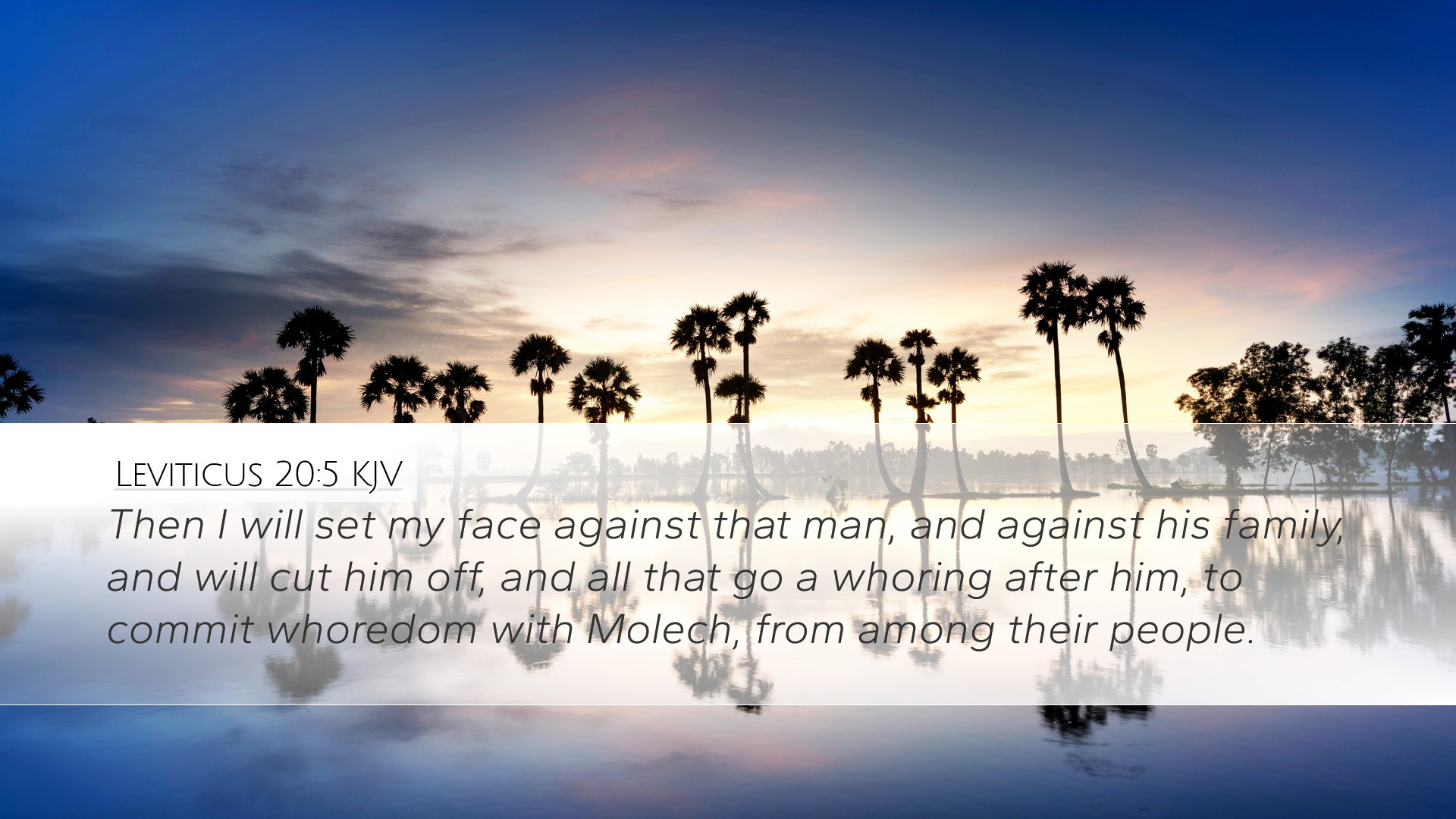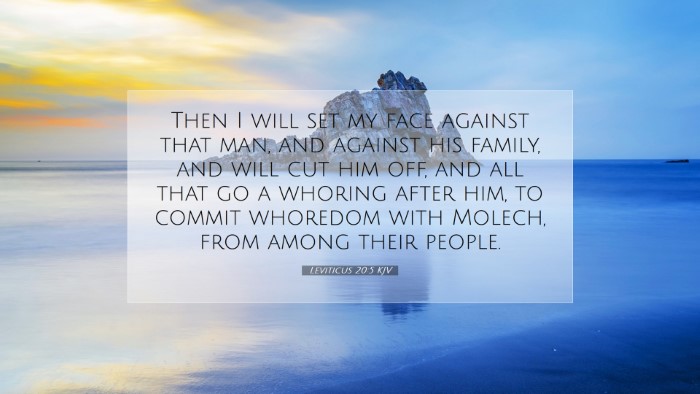Bible Commentary on Leviticus 20:5
Verse Context: Leviticus 20:5 states, "Then I will set my face against that man, and against his family, and will cut him off, and all that go a whoring after him, to commit whoredom with Molech, from among their people." This verse is a part of the larger section in Leviticus that deals with various laws and punishments for offenses against God’s commandments.
Exegesis of Leviticus 20:5
The implications of Leviticus 20:5 are significant considering the backdrop of covenantal faithfulness required of the Israelites. The worship of Molech, associated with child sacrifice, is a grave sin that brought about the sternest of God's condemnation. Throughout biblical history, this act has been denounced as a tragic display of apostasy among God’s people.
Matthew Henry's Commentary
According to Matthew Henry, this verse conveys a serious warning against idolatry, specifically the worship of Molech. Henry emphasizes the gravity of sinning against God’s statutes, noting that the punishment prescribed is severe: being cut off from among the people is tantamount to excommunication and reflects divine judgment.
- Sin’s Consequences: Henry illustrates that the consequences of leading others into sin are equally weighty. The phrase "go a whoring after him" highlights the spiritual unfaithfulness akin to adultery, indicating the deep betrayal of covenant loyalty.
- Divine Retribution: The notion of God setting His face against individuals or families indicates a personal response to their unfaithfulness, suggesting that God’s holiness is directly affronted by such actions.
Albert Barnes' Commentary
Albert Barnes offers a perspective rooted in the historical context of the Israelite people. He explicates that the worship of Molech required reprehensible acts, particularly the sacrifice of children, which were heinous in the sight of God and contrary to the divine order.
- Idolatry and Community: Barnes reiterates that the communal nature of Israelite society meant that one's sin could lead others away from God. Therefore, the collective judgment upon such actions underscores the interdependence of the community's faith.
- Cutting Off: The term "cut off" must not be merely understood as physical death but includes the idea of separation from the covenant community and the blessings of God, emphasizing the dire spiritual consequence of these actions.
Adam Clarke's Commentary
Adam Clarke expounds on the verse by connecting it to the broader theme of moral and spiritual integrity that God demands from His people. Clarke stresses that God's command is not only punitive but also protective. By prohibiting the worship of Molech, God safeguards the moral fabric of society.
- God's Protective Nature: Clarke notes that in warning about idolatry and its consequences, God exhibits His nature as a protector of innocence, particularly that of children, highlighting that His standards stem from love and justice.
- Implications for Worship: Clarke discusses the earnestness with which God requires that worship be exclusive to Himself, underlining the importance of sincere devotion while warning against the allurements of false deities.
Theological Implications
The theological implications of Leviticus 20:5 reverberate through generations. It serves not only as an admonition against idolatry but frames our understanding of the nature of sin against a holy God. It poses questions about communal responsibility in faithfulness and the weighty ramifications of leading others astray.
- Community and Individual Responsibility: The linkage between individual sin and communal fallout is a recurring theme in scripture; Leviticus 20:5 exemplifies this truth powerfully.
- God's Justice and Mercy: Additionally, this verse urges a deeper appreciation for God's justice, which is always tempered with mercy. God's judgments are meant to bring wrongdoers back to repentance rather than merely to punish them.
Practical Applications
For pastors, students, and theologians, the study of Leviticus 20:5 provides crucial insight into the necessity of holding to biblical standards in a society that often condones or promotes idolatry in various forms.
- Guarding against Modern Idolatry: The modern church must remain vigilant against modern-day equivalents of Molech, which may manifest in consumerism, secularism, or any priorities that overshadow devotion to God.
- Teaching on God’s Holiness: This verse can be used to teach about the holiness of God and the moral integrity expected of His people, urging congregations to reflect on their community’s standards in light of Scripture.
Conclusion
Leviticus 20:5 stands as a beacon of God’s holiness and justice, encapsulating the serious nature of sin and the necessary response of divine judgment. It calls both individuals and communities to fervent faithfulness to God, ensuring that worship remains pure and undiluted by falsehood.


